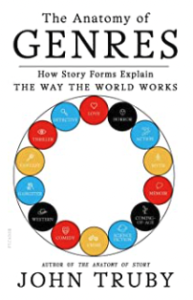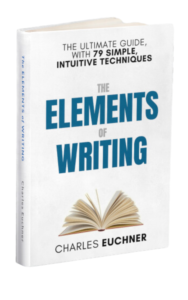 As John Truby says in The Anatomy of Genres, a genre is not just a familiar way of living in the world of stories. It is a system. Any system–from the biological system of the body or the internal combustion engine of a car–succeeds only when each of its component parts performs its job and contributes to the larger process in a reliable way.
As John Truby says in The Anatomy of Genres, a genre is not just a familiar way of living in the world of stories. It is a system. Any system–from the biological system of the body or the internal combustion engine of a car–succeeds only when each of its component parts performs its job and contributes to the larger process in a reliable way.
 (For an interview with Truby, go here. To purchase The Anatomy of Genres, go to anatomyofgenres.com. For story courses and story software, go to truby.com.)
(For an interview with Truby, go here. To purchase The Anatomy of Genres, go to anatomyofgenres.com. For story courses and story software, go to truby.com.)
Truby discusses 14 genres, in the following order: Horror, Action, Myth, Memoir, Coming of Age, Science Fiction, Crime, Comedy, Western, Gangster, Fantasy, Thriller, Detective, and Love Story. They move from the most primal issue (death) to the most transcendent (connection).
To develop your story, follow the complete system for your genres. Make sure to include the specific “beats” essential to that genre.
| Horror | Action | Myth |
| 1. Ghost: sins of the past
2. Story world: haunted house and close society 3. Monster attacks 4. Hero as victim 5. Weakness Need 1: slavery of mind and the monster within 6. Weakness Need 2: shame and guilt 7. Desire: defeat the monster, defeat death 8. Opponent: the monster, the other in the extreme 9. Ally: the rational skeptic 10. Crossing the barrier to the forbidden 11. Plan: reactive 12. Drive: the monster attacks escalate 13. Battle: safe haven 14. No self-revelation 15. The double ending: eternal recurrence
|
1. Hero’s defining crisis
2. Story world: enslavement from physical attack 3. The warrior’s moral code: courage in the world to greatness 4. Weakness need: shame culture in the world to violence 5. Desire: success, glory, and personal freedom 6. Collecting the allies 7. Opposition: external bondage 8. Game plan 9. Revelation leads to decisions 10. Drive: cat and mouse 11. Moral argument: the great versus the good 12. Vortex point and violent final battle 13. Self-revelation 14. Farewell or communion
|
1. Story world: natural world in two cultures
2. Ghost: difficult birth and losing the father 3. Character web: the great chain of being 4. Character web: archetypes 5. Myth hero: searcher 6. Weakness-need 7. Inciting event: talisman 8. Desire: journey and destiny 9. Allies 10. Opponent: successive strangers 11. Drive: symbolic objects 12. Revelation: opponents attack 13. Gate, gauntlet, visit to the underworld… 14. Violent battle 15. Self-revelation: public/cosmic revelation 16. New equilibrium: outgrow the code
|
| Memoir/Coming of Age | Science Fiction | Crime |
| 1. Story world: system of slavery
2. Hero’s role: detective of oneself 3. Story frame 4. Point of view 5. Ghost: family abuse 6. Weakness need: deepest wounds and shame and guilt 7. Double desire 8. Opponent: family or group members 9. Plan 10. Reveals and decisions 11. Drive: moral argument 12. Battle: family opponent 13. Double self-revelation 14. Moral decision: forgiveness/farewell 15. New equilibrium: moral effect
|
1. Story world…Weakness need: unevolved
2. Minor characters: creating society and system 3. Desire 4. Opponent: authorities 5. Plan 6. Plot: sub worlds 7. Reveal 8. Battle 9. Self-revelation: public/cosmic
|
1. Story world: slavery of superficial society
2. Inciting event: crime 3. Cop hero strengths and weakness need 4. Values and moral code 5. Desire: catch a criminal 6. Opponent/mystery: super criminal 7. *Drive: cat and mouse 8. Reveal: criminal uncover 9. Drive: moral argument 10. Apparent defeat: the criminal escapes 11. Gate-gauntlet-visit to death, chase 12. Silent battle or big revelation 13. Self revelation, society reaffirmed 14. Moral argument conclusion, poetic justice
|
| Comedy | Western | Gangster |
| 1. Weakness need: comic gap
2. Character web: comic character types 3. Inciting event: leapfrog 4. Desire: clothesline 5. Opposition: four points 6. Plan: scam 7. *Drive: the overall danger 8. Battle: ultimate worst nightmare 9. Self revelation 10. New equilibrium: marriage of new community
|
1. Story world the New World
2. Hero’s role: the cowboy as fighter 3. The cowboy’s values: the code of the West 4. Weakness-need: the loner and the man of shame 5. Desire: save the builders of civilization 6. Opponent: Indians and bad cowboys 7. Opponent’s plan: destruction 8. Plan: direct confrontation 9. Battle: showdown 10. Moral argument: the moral showdown 11. Self-revelation: eternal wanderer 12. New equilibrium: doomed man |
1. Story world: the corrupt city hero: gangster as killer
2. Weakness-need: contradictory character 3. Inciting event: petty crime 4. Desire: money and empire 5. Allies: gang members 6. Opponent: gang boss, rivals, gangs, and cops 7. Plan: deception and violence 8. Fake ally: gang members 9. Reveal: betrayal 10. Battle: mass murder or massive destruction 11. No self-revelation 12. New equilibrium: death or death of the soul |
| Fantasy | Thriller/Detective | Love |
| 1. Story world
2. Hero: Explorer 3. Desire: explore an imaginary world 4. Character web: fantastic characters 5. Opponent: authorities 6. Plan 7. Passageways between worlds 8. Drive: Journey through subworlds… 9. The super magical moment 10. Battle: the final test 11. Self-revelation: free and fun
|
1. Opponent’s plan to commit murder
2. Story world: enslaving society 3. Hero role: search for the truth 4. Detective ghost 5. Detective strengths and weaknesses 6. Detective weaknesses 7. Values: code 8. Detective desire: solve mystery & find truth 9. Opposition: killer, suspects, and mystery 10. Plan #1: investigation 11. Opposition’s plan: red herrings, false meaning, and lies 12. Plan/investigation #2: questioning 13. Plan/investigation #3: intuition and deductive logic 14. Plan/investigation #4: flashback, changed POV 15. Plan/investigation #5: recreate a new reality/story 16. Reveal the killer’s fatal mistake 17. Battle: trial of the killer and the battle of stories 18. Battle: opponent’s final attack 19. Self-revelation: the detective sees her own crime 20. Moral argument: poetic justice |
1. Story world/canvas & field of play: Mind-body & exotic subworld
2. Technology: words of love 3. Ghost: cycle of fear 4. Hero’s role: lover 5. Weakness-need: Inability to love 6. Desire: gaze, meeting, longing 7. Allies: love advisers 8. Character web 9. Main opponent: lover 10. Opposition step 1: the joust 11. Opposition step 2: Additional suitors 12. Plan: the scam 13. Drive 1: Initiating 14. Drive 2: Flirting 15. Drive 3: seduction (verbal first dance) 16. Revelation: the first dance 17. Revelation: the first kiss 18. Apparent victory: Perfect love moment 19. Apparent defeat: breakup 20. Moral decline 21. Battle of words 22. Self-revelation: double reversal 23. New equilibrium: Communion or farewell
|


